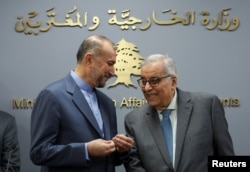Iran, Hamas' major supporter, has warned that Israel "could receive a response" from Tehran's allies amid growing fears the conflict between Israel and Hamas could spiral into a regional Middle East war.
Israel responded to Saturday's cross-border attack by Hamas by dropping over 6,000 bombs on what it described as Hamas targets in Gaza. Authorities there say more than 1,500 Palestinians have already been killed in the retaliatory strikes, including over 500 children.
Israel's military Friday told all civilians in northern Gaza — more than 1 million people — to relocate south within 24 hours, as it amassed tanks and troops on the border ahead of an expected ground invasion.
Arriving in Beirut on Thursday for talks with his Lebanese counterpart, Iranian Foreign Affairs Minister Hossein Amirabdollahian warned that Tehran's allies in the region could take action against Israel.
"The continuation of war crimes against Palestine and Gaza will receive a response from the rest of the axis. And naturally, the Zionist entity and its supporters will be responsible for the consequences of that," Amirabdollahian said.
He added that the displacement of Palestinians and cutting water and electricity to the Gaza Strip are considered war crimes. Israel has said it will continue a complete siege of Gaza until all the hostages kidnapped by Hamas are freed.
Amirabdollahian did not specify which groups belonged to the axis. Tehran's other allies and proxies in the region are Syria, Palestinian militant groups such as Islamic Jihad, the Lebanese militant group Hezbollah, and Houthi rebels in Yemen.
"If Israel is going to mount a ground invasion of Gaza, I think there is real concern that these other groups that have gotten Iranian support and that share Iran's goals and share Iran's animosity toward Israel, that they might get involved as well," said Barbara Slavin, a Middle East analyst at the Stimson Center in Washington.
Hezbollah is better armed than Hamas. Israeli forces have exchanged sporadic rocket fire with Hezbollah fighters in recent days and three Hezbollah fighters were killed in cross-border clashes.
Any attack on Israel by Hezbollah would be coordinated by Iran, said Behnam Ben Taleblu, an analyst with the Foundation for the Defense of Democracies in Washington. "There is a lot known [about] the relationship of each proxy to the patron — Hezbollah to Iran, Palestinian Islamic Jihad to Iran, the Houthis to Iran. But there is not much known about the relationship between each spoke," he said.
Israel could seek to expand its strikes against Iran's allies and proxies beyond Gaza, Taleblu added.
"I think certainly if there is more than one front active at the same time, it would be the beginning of treating this as a larger regionwide war phenomenon," he told VOA.
"But you know, there's always the potential for Israel to strike elsewhere, of course, not just Lebanon, which would invoke a third Lebanon war — but potentially the widening of what is already underway between Israel and Iran indirectly, which is the war between the wars, the cyber element, the maritime element."
Meanwhile Syria accused Israel of carrying out missile strikes on airports in Damascus and Aleppo on Thursday, damaging their runways. Israel did not comment on the reports. It has previously accused Syria of facilitating arms shipments from Iran to militant groups in the region.
Unity government could give foes pause
In the wake of the Hamas attack, Israeli politicians, riven by bitter internal divisions, have formed a unity government. That may give pause to the country's foes, former U.S. Middle East envoy Dennis Ross said.
"I don't rule out the possibility there'll be an all-out war, although, because Hezbollah was counting on divisions in Israel, and I think [Hezbollah have] seen what they were thinking about Israel — in terms of divisions — is no longer the case, so that may also temper their interest in all-out war," Ross told Reuters.
"And as I said, Iran may have an interest in keeping Hezbollah in reserve in the event that they think they may be attacked [by Israel]."
Israel is unlikely to attack Iran directly, analyst Lina Khatib, director of Middle East Institute at SOAS University of London, told VOA, "because this would already stretch resources that this war [against Hamas] has shown to be stretched in Israel, at the level of intelligence for example."
U.S. Secretary of State Antony Blinken is touring the Middle East in an effort to prevent the conflict spreading. Following his visit to Israel this week, Blinken arrived in Jordan on Friday for meetings with King Abdullah II and Palestinian Authority President Mahmoud Abbas. He is also due to visit Saudi Arabia, Bahrain, the United Arab Emirates and Qatar.
The United States has sent an aircraft carrier fleet to the region. President Joe Biden said Wednesday it was intended as a warning to Tehran.
"We're surging additional military assistance to the Israeli Defense Force, including ammunition, interceptors to replenish the Iron Dome. And we moved the U.S. carrier fleet to the Eastern Mediterranean; are sending more fighter jets there in that region and made it clear, made it clear to the Iranians: Be careful," Biden said during an address at a roundtable with Jewish community leaders at the White House.







